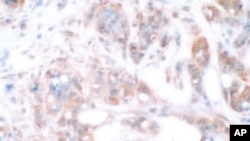Almost all cells need iron to grow. Now, researchers have identified a link between the body's system for regulating iron and breast cancer. The discovery could help doctors predict the course of breast cancer disease and even help them decide the most appropriate treatment.
Iron is a vital nutrient, but too much iron can be harmful. Researchers at Wake Forest University in Winston-Salem, North Carolina, looked at a certain protein that regulates iron and studied the amount of it in breast cancer cells.
"And what we found is that a protein called ferroportin that removes iron from cells, that eliminates iron from cells, was markedly reduced in breast cancers when compared to normal breast cells. And in fact was most reduced in the most aggressive breast cancers," said Frank Torti, who led the research team.
They found that ferroportin levels were a good predictor of the course of the cancer, specifically whether breast cancer survivors would have a recurrence of the disease.
"When ferroportin was high, women did well, and when ferroportin was low, women did poorly."
The predictive power of ferroportin is still just a laboratory finding, but Torti says it suggests a possible novel approach to cancer therapy.
"I think that our study points to ferroportin as a target for the development of cancer drugs. In other words, we and others will be looking at ways to raise ferroportin in cancer cells, and that might be an important target for breast cancer treatment and eventually a treatment that can be used in patients."
Wake Forest University professor Frank Torti was interviewed by the journal Science Translational Medicine, which published his findings in their online edition.




